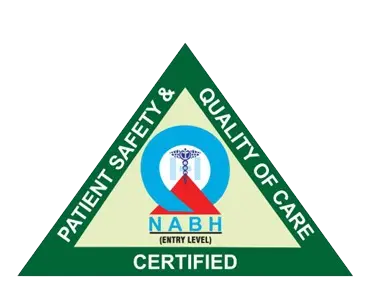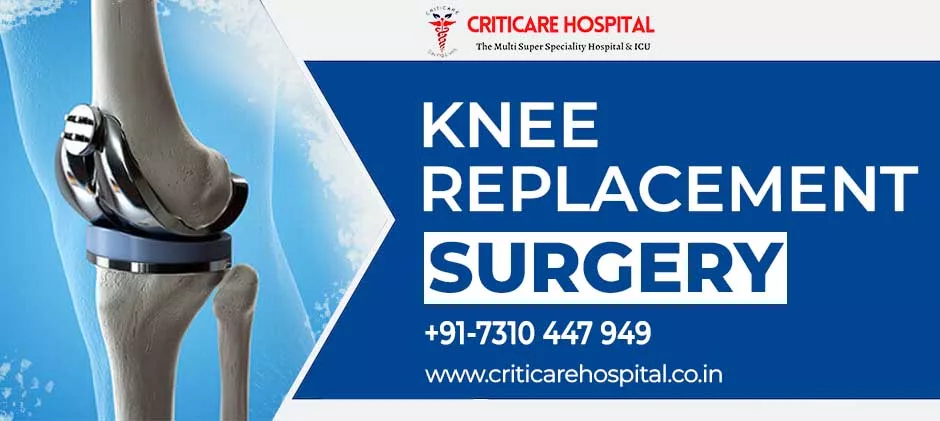Orthopaedics & Knee Replacement Hospital in Lucknow
What is Knee Joint Replacement Surgery?
Consider complete knee replacement surgery if your knee pain is harming your quality of life and doesn’t appear to be improving despite alternative treatment options. A doctor would typically advise trying several other options first before suggesting surgery. These include exercising, using painkillers, and decreasing weight if necessary.
If the majority of the following questions are answered in the affirmative, surgery may be the best course of action.
- Do you get knee discomfort during the night?
- Do you find it difficult to walk?
- Do you get pain when you stand up or exit a moving vehicle?
- Can you easily navigate the stairs?
- Do over-the-counter (OTC) medicines not work as they should?
However, having surgery might be a big task. You need a total knee replacement if you have substantial X-ray abnormalities, knee deformities, or advanced arthritic symptoms.
Pain, crepitus, stiffness, limping, muscular weakening, motion restriction, and edema are signs of advanced knee arthritis.
It might be worthwhile to get a second opinion if only one doctor has recommended the surgery.
Treatment Carried by Arthritis at Criticare Hospital
Translated as “arthritis,” inflammation of the joints where two bones touch, like in your elbow or knee, are joints. There are numerous forms of arthritis, each with a unique etiology and course of treatment.
Other organs, such as your eyes, heart, or skin, may also be impacted by some types.
Joint discomfort, redness, heat, and swelling are all typical signs of arthritis. If you have arthritis, your doctor must determine what kind it is so that you can receive the best care possible. Fortunately, the majority of people with arthritis may lead active, useful lives because of modern medicines.
Different Types of Arthritis Affect Your Joints Differently
Ankylosing spondylitis – Ankylosing spondylitis is a form of arthritis that affects the spine’s ligaments and joints, causing inflammation.
Gout – Gout is a form of arthritis that flares up occasionally, usually affecting the big toe or the lower leg.
Juvenile idiopathic arthritis – The most prevalent kind of childhood chronic arthritis is juvenile idiopathic arthritis.
Osteoarthritis – The most prevalent kind of arthritis, osteoarthritis, affects elderly adults more frequently.
Psoriatic arthritis – People with psoriasis may develop psoriatic arthritis (scaly red and white skin patches). Skin, joints, and regions where tissues cling to bone are all impacted.
Reactive arthritis – A bodily infection is the root of reactive arthritis. Symptoms frequently go away on their own in a matter of weeks or months.
Rheumatoid arthritis – An autoimmune form of arthritis called rheumatoid arthritis occurs when the immune system targets healthy joint tissues.
What are the types of joint replacement surgery?
Total Knee Replacement Surgery at Lucknow
Total knee replacement (TKR) is a surgical procedure used to realign the soft tissues, remove structural and functional impairments, and replace the injured joint with a prosthetic implant. By increasing muscle balance, enhancing joint range of motion, reducing pain, and restoring normal biomechanics, TKR helps patients live better, healthier lives. The surgical approach and the patient’s health influence how long it takes to recuperate and how aggressively you are treated.
Partial Knee Replacement in Lucknow
Surgery to replace only a portion of a damaged knee is known as a “partial knee replacement.” It can replace the medial (inside) or lateral (outside) or kneecap portion of the knee.
The knee joint’s deteriorated bone and tissue are removed during partial knee replacement surgery.
An artificial prosthetic implant is used to replace the missing tissue. Your knee’s remaining portion is unharmed. Smaller incisions are typically used for partial knee replacements, which reduces recuperation time.
signs you need a total knee replacement
Now that we are clear on what knee replacement surgery entails, let’s discuss when it could be necessary. People who require knee replacement surgery frequently have arthritis of the knee, a condition that destroys knee cartilage. The bones begin to rub against one another as a result.
It’s crucial to realize that you don’t need knee replacement surgery just because you have knee arthritis. However, it may be an option if the disorder has injured your knee and symptoms like pain, instability, and stiffness are interfering with your regular activities.
By replacing tough cartilage and worn-out bone ends, knee replacement surgery can increase the stability and mobility of the knee joint.
You must fulfill two important prerequisites to be eligible for a knee replacement. One is that you have suffered a large loss of cartilage. This is typically assessed by having your knee X-rayed while you are standing. The gap between the knee bones is thought to be getting smaller due to cartilage loss. The other is that the loss is so severe that it is impairing your quality of life, whether it be because of pain, restricted function, or a combination of the two.
Possible Advantages of Knee Replacement Surgery
People with significant knee pain who are no longer receptive to previous treatments may require knee replacement surgery. Osteoarthritis, rheumatoid arthritis, abnormalities, and injuries can all cause harm to the knee. Among the many advantages of knee replacement surgery are the following:
Pain reduction When severe pain is persistent and unresponsive to alternative treatment options, knee replacement surgery may be necessary. A successful knee operation can reduce or even eliminate crippling knee pain.
Enhanced Mobility Before surgery, severe knee discomfort might make it difficult to walk, climb stairs, exercise, etc. Following a successful knee replacement, mobility may improve.
Highly effective and has enduring advantages. According to studies, up to 90% of patients who had knee replacements reported being satisfied. The average lifespan of a knee replacement is 20 years.




